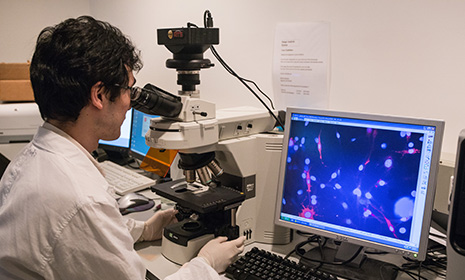HKU Reveals that Exposure to Particulate Air Pollutants is Associated with Cancer Mortality in a 13-year Local Study of Hong Kong Elderly
*adapted from the contents published by the Li Ka Shing Faculty of Medicine, The University of Hong Kong at http://www.med.hku.hk/v1/archives/13837
A team of researchers at the School of Public Health of Li Ka Shing Faculty of Medicine, The University of Hong Kong (HKU), found that long-term exposure to ambient fine particulate matter, a mixture of environmental pollutants, is associated with increased risk of mortality from many types of cancer in an elderly Hong Kong population. Findings of the study were published in the journal Cancer Epidemiology, Biomarkers & Prevention (http://www.aacr.org/Newsroom/Pages/News-Release-Detail.aspx?ItemID=886#.VyLdpvl97y0), a journal of the American Association for Cancer Research, in April 2016.
Research Method and Findings
The said study was the first territory-wide study on cancer involving local elderly followed up for thirteen years. The team of scientists analysed the risk of mortality from cancers and exposure to ambient fine particulate matter (i.e. particulates with an aerodynamic diameter of less than 2.5 micrometers, PM2.5) on 66,820 persons aged 65 or above who were enrolled in the Elderly Health Services Cohort of the Department of Health from 1998 to 2001 and subsequently followed up until 2011. Their causes of death were ascertained based on Deaths Registries in Hong Kong. Annual concentrations of PM2.5 at their residential addresses were estimated using PM2.5 concentrations measured at fixed-site monitors, horizontal-vertical locations, and satellite data.
After adjusting for the factor of smoking, the study showed that the risk of dying from any cancer rose by 22%, by 42% from cancer in the upper digestive tract, by 35% from accessory digestive organs, which include the liver, bile ducts, gall bladder, and pancreas for every 10 µg/m3 increase in PM2.5. The rate of increase in PM2.5 was also associated with an 80% increased risk of mortality from breast cancer for women, and a 36% increased risk of dying of lung cancer for men.
Research Implications
The lead researcher of this study, Dr Wong Chit-ming, Honorary Associate Professor of the School of Public Health, Li Ka Shing Faculty of Medicine, HKU, says, “The study findings are of public health importance, particularly in Asia where air quality is poor and that local data on the long-term health effects of PM2.5 to support policy on air quality management is scarce.”
The study’s co-lead author, Dr Thach Thuan-quoc, Scientific Officer of the School of Public Health, HKU, further explains, “Long-term exposure to particulate matter has been associated with mortality mainly from cardiopulmonary causes and lung cancer, but there have been few studies showing an association with mortality from other cancers. We suspected that these particulates could have an equivalent effect on cancers elsewhere in the body.” Particulate matter are particles found in the air, including hydrocarbons and heavy metals produced by transportation and power generation, among other sources, Dr Thach elucidated.
Policy Recommendations
Dr Thach indicated that some possible explanations for the association between PM2.5 and cancer could include defects in DNA repair function, alterations in the body’s immune response, or inflammation that triggers angiogenesis, the growth of new blood vessels that allows tumors to spread. In the case of the digestive organs, heavy metal pollution could affect gut microbiota and influence the development of cancer, Dr Thach added.
“Further research would be required to determine whether other countries experience similar associations between PM2.5 and cancer deaths, but this study combined with existing research suggests that other urban populations may carry the same risks. The implications for other similar cities around the world are that PM2.5 must be reduced as much and as fast as possible. Air pollution remains a clear, modifiable public health concern,” the team said.
A limitation of the study is that it focused solely on PM2.5. Dr Thach said that emerging research is beginning to study the effects of exposure to multiple pollutants on human health. He also cautioned that pollution is just one risk factor for cancer, and others, such as diet and exercise, may be more significant and more modifiable risk factors.
About the Research Team
The research team is co-led by Dr Wong Chit-ming, Honorary Associate Professor, and Dr Thach Thuan-quoc, Scientific Officer, both of whom are with the School of Public Health, Li Ka Shing Faculty of Medicine, HKU. Others collaborators are environmental or public health researchers and medical professionals from three institutes in Hong Kong and the United Kingdom, namely the Hong Kong SAR Government’s Department of Health, Hong Kong University of Science and Technology’s Division of Environment, and the University of Birmingham’s School of Health and Population Sciences. This research study was supported by Wellcome Trust.
About the School of Public Health, Li Ka Shing Faculty of Medicine, HKU
The School of Public Health, Li Ka Shing Faculty of Medicine, HKU has a long and distinguished history in public health education and high impact research. With world leading research in infectious diseases as well as on non-communicable diseases of both local and global importance, the School has made significant contributions through its research and advocacy to improve the health of populations and individuals, both locally and globally. The School is a leading research and teaching hub in public health on influenza and other emerging viruses, control of infectious and non-communicable diseases, tobacco control, air pollution, psycho-oncology, behavioral sciences, life-course epidemiology, and health economics, health services planning and management. This work has informed international (e.g. the World Health Organization, Food and Agriculture Organisation of the United Nations), national and local public health policies.

The lead researcher of this study, Dr Wong Chit-ming, Honorary Associate Professor of the School of Public Health, Li Ka Shing Faculty of Medicine, HKU, says, “The study findings are of public health importance, particularly in Asia where air quality is poor and that local data on the long-term health effects of PM2.5 to support policy on air quality management is scarce.”

Dr Thach Thuan-quoc, Scientific Officer of the School of Public Health, Li Ka Shing Faculty of Medicine, HKU, the study’s co-lead author, points out that long-term exposure to ambient fine particulate matter, a mixture of environmental pollutants, is associated with increased risk of mortality from many types of cancer in an elderly Hong Kong population.








.png)
